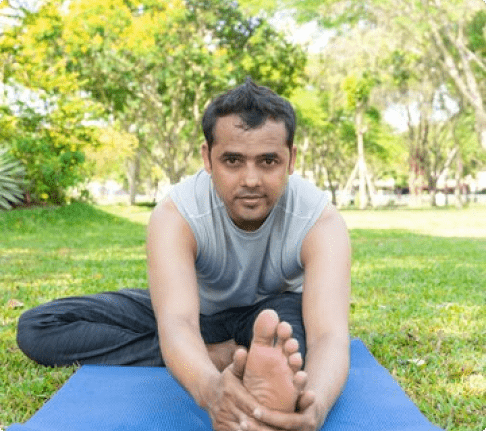- Visiting Hours: Mon-Sat / 8:00 AM - 8:00 PM
- Visiting Hours: Mon-Sat / 8:00 AM - 8:00 PM
Type 2 diabetes affects nearly 77 million people in India alone. Type 2 diabetes is a chronic metabolic disorder characterized by high blood sugar levels resulting from insulin resistance and relative insulin deficiency.
Insulin, produced by the pancreas, is essential for regulating blood sugar levels as it helps in the uptake of glucose into cells for energy production. In Type 2 diabetes, the body’s cells become resistant to the effects of insulin, leading to impaired glucose uptake despite sufficient insulin secretion. Over time, the pancreas may struggle to produce enough insulin to compensate for this resistance, ultimately causing increased blood sugar levels.
When blood sugar levels are elevated for a prolonged period without being used by cells, the body tries to break down other substances, such as fats and proteins, to derive the required energy.
This can cause a cascade of events affecting different parts of the body, such as the heart, liver, kidney, gums, eyes, and nerves. The conditions of Type 2 diabetes progress if it is left untreated and may even lead to permanent organ damage.





Type 2 diabetes manifests with various symptoms, often developing gradually and remaining unnoticed until complications arise. The common symptoms include:
Many individuals with Type 2 diabetes may not exhibit symptoms initially. Hence, regular screenings for high blood sugar levels are crucial, particularly for those with risk factors such as obesity, a sedentary lifestyle, or a family history of diabetes. Early detection and intervention are essential in managing Type 2 diabetes and preventing complications such as heart disease, kidney damage, and nerve damage.



The primary cause of Type 2 diabetes is insulin resistance. In Type 2 diabetes, cells become resistant to the effects of insulin; that is, they don’t respond as effectively to insulin’s signals to take up glucose. This leads to elevated blood sugar levels.
Type 2 diabetes can also involve dysfunction of the pancreas. Over time, the pancreas may be unable to produce enough insulin to overcome insulin resistance, resulting in elevated blood sugar levels.
Further, individuals with a family history of Type 2 diabetes are at higher risk of developing the condition, as are those diagnosed with obesity or excess body weight.
Unhealthy lifestyle factors—including sedentary patterns, poor dietary habits (such as consuming excessive refined sugars and unhealthy fats), and smoking, alcohol consumption – can contribute to the development of Type 2 diabetes.
The risk of Type 2 diabetes increases with age, particularly after 45 years. The risk of developing the disease is also elevated with gestational diabetes. Women who develop diabetes during pregnancy are at an increased risk of developing Type 2 diabetes later in life.
Some other medical conditions, such as polycystic ovary syndrome (PCOS), hypertension (high blood pressure), and metabolic syndrome, are also associated with an increased risk of Type 2 diabetes.
Poor sleep, stress and excessive usage of electronic devices can also contribute to the development of diabetes.





In Type 2 diabetes, the body develops insulin resistance, with the cells becoming less responsive to insulin’s signals, leading to elevated blood sugar levels. Unlike in Type 1 diabetes, the pancreas produces insulin, but the levels are insufficient to overcome the resistance. The body is unable to transport the sugars into cells or otherwise process them, resulting in impaired glucose uptake. Managing insulin resistance through lifestyle changes or medications is crucial in Type 2 diabetes treatment.
In Type 2 diabetes, glucose regulation is disrupted due to insulin resistance. The cells struggle to absorb glucose efficiently, leading to elevated blood sugar levels. It can occur due to pregnancy-induced hormonal changes in women and due to habits and lifestyle choices, including high stress, in both sexes. Type 2 diabetes can lead to various complications such as cardiovascular disease, nerve damage, and kidney dysfunction. Managing glucose levels is crucial for the treatment of Type 2 diabetes, as insulin injections can’t help when cells are unable to use it.



Type 2 diabetes is a complex disease, and a variety of genetic, environmental, and lifestyle factors can increase the risk of developing it.
Primarily, a family history or having a close relative with Type 2 diabetes increases the risk. Obesity or excess body weight, particularly around the abdomen (central obesity), is also a significant risk factor. This is because fat cells release hormones and substances that can interfere with insulin’s function
Exercise and diet are also crucial contributing factors to Type 2 diabetes. Lack of regular physical activity is associated with an increased risk, as exercise helps control weight, uses glucose for energy, and makes cells more sensitive to insulin.
Diets high in refined sugars, unhealthy fats, packaged and fast foods, and processed foods also increase the risk of developing Type 2 diabetes. In contrast, a diet rich in fruits, vegetables, whole grains, and lean proteins can help reduce the risk.
Overall, the risk of Type 2 diabetes increases with age, particularly after 45 years. Some conditions, such as Polycystic Ovary Syndrome (PCOS), a hormonal disorder in women characterized by irregular periods and excess male hormone levels, lead to a higher risk of developing insulin resistance and Type 2 diabetes. Further, high blood pressure and abnormal lipid levels contribute to cardiovascular complications associated with diabetes.




Prevention is always better than cure. We perform routine physical and wellness check-ups to ensure that any disease is detected and treated in its initial stages.



Genetic factors can predispose people to insulin resistance, the underlying cause of Type 2 diabetes. Thus, if your parents or close relatives have the disease, you have a higher chance of getting it as well.
However, a family history does not mean you will definitely get the disease. Various lifestyle-related factors, such as age, obesity, diet, lack of activity and exercise, high screen time, high stress levels, etc., can be critical triggers for Type 2 diabetes.
People with a family history of Type 2 diabetes need to keep a careful check of their blood sugar levels and overall health. Regular consultations with a doctor are advised. A diabetologist or healthcare professional may recommend genetic testing to assess the disease risk more accurately and tailor appropriate preventive measures.



Type 2 diabetes can lead to various complications, especially when not managed properly. These complications can affect different parts of the body and significantly impact overall health and quality of life:





There are various habits and changes you can adopt to prevent the onset of Type 2 diabetes. The primary recommendations include:
If you have a family history of diabetes and you are experiencing any of the primary symptoms, such as weight gain/ loss, frequent urination, increased thirst, etc, it is best to consult a doctor. You can check your blood sugar levels by using at-home kits, and if the levels are high, consulting a doctor is the recommended option. Early detection and treatment can positively and significantly affect the disease progression.



Would you like to manage your diabetes better and lead a healthier, normal life?
Take an appointment with our senior diabetologist today!